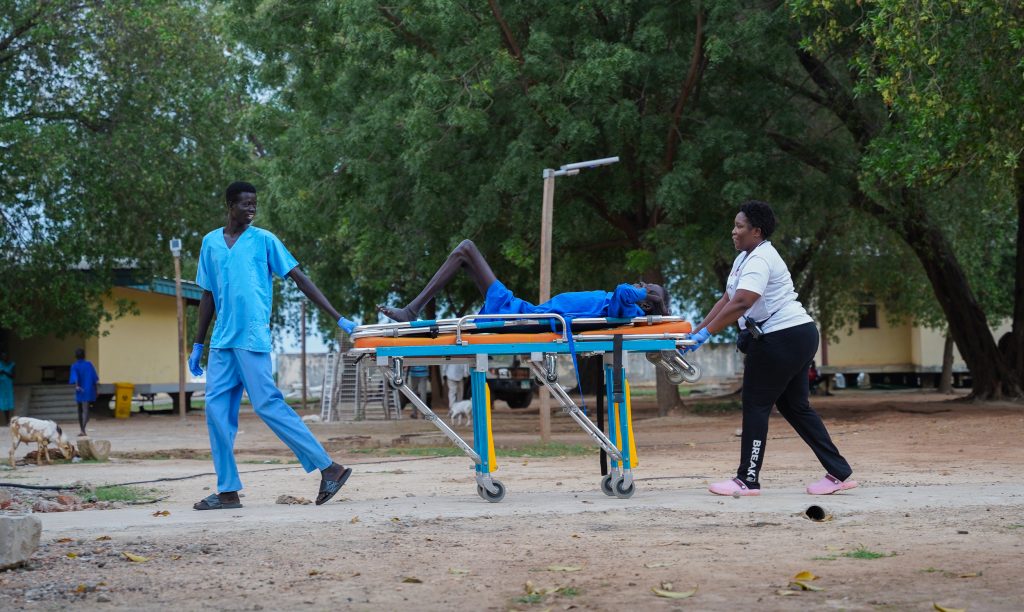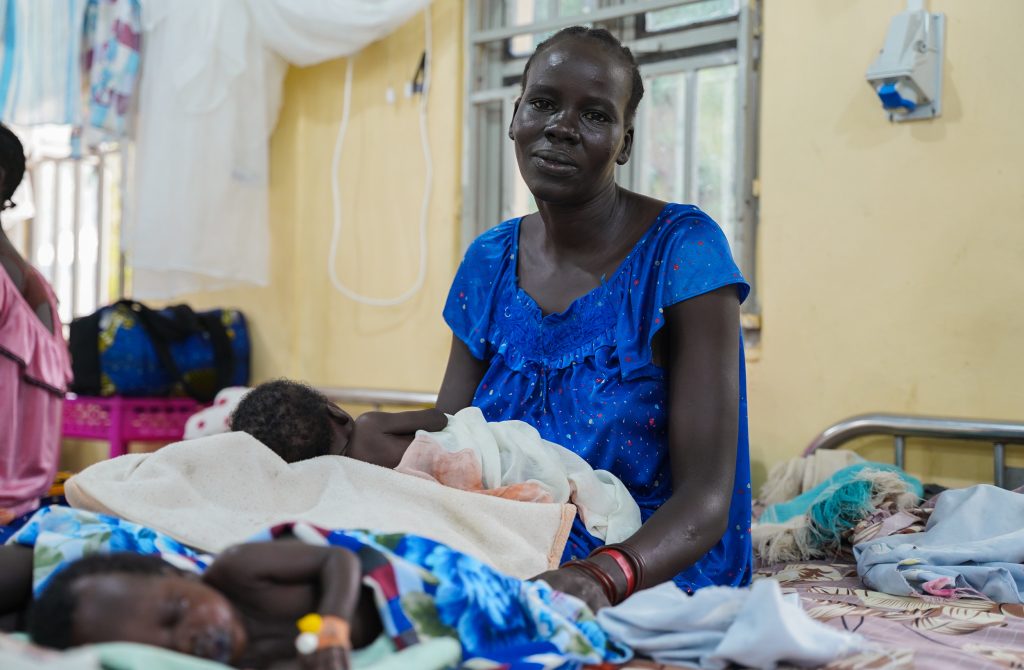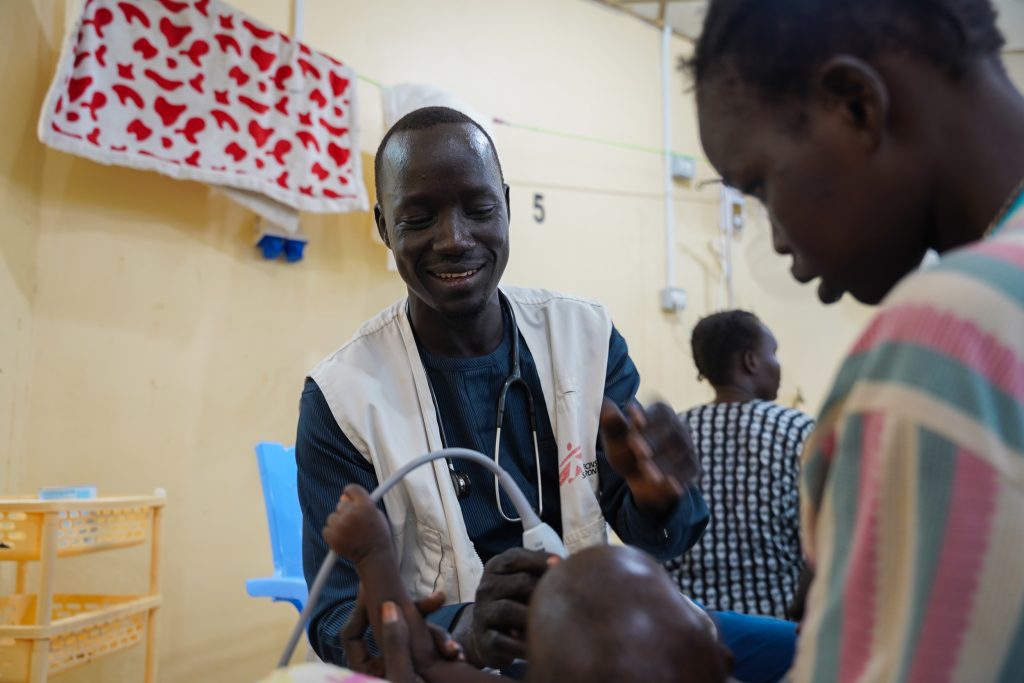Upon entering through the UN compound gate in the Bentiu internally displaced persons camp in Unity State, a red structure comes into view. Next to it stands a pole with a white MSF flag and, on either side, concrete bags filled with sand. Behind this simple façade lies a hospital where thousands of babies were born, children received care for malnutrition and both children and adults were treated for diseases such as malaria among others over the course of ten years.
Today, the facility is vacant — handwashing posters hang outside empty halls that once served as inpatient wards, the operating theatre is stripped bare and the once-bustling consultation rooms now stand empty. At the end of June 2025, MSF completed the transition of our medical services from the Bentiu internally displaced persons camp to the government-owned Bentiu state hospital. This strategic move, initiated in July 2024, aimed to consolidate medical services, enhance infrastructure and ensure long-term sustainability by establishing a collaborative framework with the Ministry of Health. All healthcare services previously offered by MSF at the camp — including maternal, pediatric, surgical and inpatient care — are now available at Bentiu state hospital.
The civil war, birth of the camp and MSF secondary healthcare hospital
In 2014, when civil war broke out in South Sudan, heavy fighting and targeted violence in Unity State forced thousands of people to flee. Many sought protection at the United Nations base in Bentiu, leading to the rapid establishment of a Protection of Civilians site.
That year, MSF started working in the site in response to overwhelming humanitarian needs, including high rates of injuries, disease outbreaks, malnutrition and lack of basic health services. The site quickly became the largest in the country, now known as the Bentiu internally displaced persons camp, hosting close to 150,000 people.
Since then, MSF ran a 175-bed hospital inside the camp, offering specialist medical care, emergency services, surgery, maternal and pediatric care. In Bentiu town, MSF also runs a clinic focused on sexual and gender-based violence as well as sexual and reproductive health, supported by outreach and community engagement activities.
Until 2024, when the transition began, MSF had conducted over 768,732 outpatient consultations, treated 257,793 patients for malaria, assisted with more than 3,810 deliveries, including 281 via caesarean sections, performed 7,491 surgeries and treated 5,282 children for malnutrition and 2,864 for measles. During this period, MSF also responded to numerous disease outbreaks and crises, such as cholera and hepatitis E.
Following the signing and gradual implementation of the peace agreement, the Bentiu Protection of Civilians site was officially reclassified as an internally displaced persons camp in 2021. This reflected improved security conditions and a shift in management responsibilities from the United Nations Mission in South Sudan to state and civilian authorities.
With the gradual return to peace and the free movement of people between the camp and other parts of Bentiu, many individuals would come to the MSF-run hospital in the camp to access healthcare services.

The public healthcare system in South Sudan has been severely underfunded and under-resourced for years, relying heavily on support from donors and humanitarian organizations. Frequent shortages of medical supplies, a lack of staff and limited capacity to respond to emergencies in a context marked by recurrent disease outbreaks challenge many public healthcare facilities. While MSF served as a complementary secondary hospital in the area, a public secondary hospital in Bentiu town, located less than 5 kilometres away, struggled to maintain its services.
Nyamai Buay, 34, sits on her bed at the Bentiu state hospital, cradling her three-day-old twins, whom she delivered there. She recounts the struggles she faced while trying to deliver her nine children.

To strengthen the public healthcare system and ensure the long-term sustainability of services, MSF decided to gradually transfer all primary and secondary healthcare services from the Bentiu camp facility to Bentiu state hospital.
Following the signing of the memorandum of understanding, MSF began to renovate various facilities in Bentiu state hospital in July 2024. Moving services in phases, we started with the pediatric ward, which was officially launched in October that year. Other units then followed, including maternity, surgical, and emergency units among others, until the completion in June 2025. The gradual move was done to ensure minimal disruption of services in both facilities during the shift.
Today, MSF is working hand-in-hand with the Ministry of Health in Bentiu state hospital, providing much-needed care to the people of Bentiu. However, MSF continues to provide services for sexual and reproductive health, as well as run health promotion and community engagement activities in Bentiu camp. MSF also continues to run disease surveillance activities and will maintain a capacity to respond to emerging crises and disease outbreaks.

Despite this major step to improve access and sustainability of the healthcare system, the decision was not easy for MSF to make. “It was painful because we had very dedicated MSF trained staff,” says Omale. “So, it was quite a challenge. We approached everything with compassion and transparency and kept the staff updated with all the discussions, the plans and various procedures. It was quite a challenge at the time not only for the community, but also for other international organizations, because it coincided, unfortunately, with funding cuts.”
Significant gaps remain in Bentiu, which impact people’s health and well-being, while limiting access to proper healthcare services. Poor water and sanitation conditions continue to increase morbidity due to water-borne diseases, including the ongoing cholera outbreak in the country, in which more than 26,213 cases were reported in Unity State alone since September 2024 to July 2025. MSF is concerned about the reduction of humanitarian support amid these rising needs, which are already affecting the rehabilitation of latrines and establishment of clean water collection points.
For people like Nyamai, this shift is already a positive one and will go a long way in improving how they access healthcare services. “This time, I came to Bentiu state hospital early. I delivered three days ago. I chose to come because I know hospitals offer better care, and knowing that I wouldn’t be referred to the Protection of Civilians site was a huge relief, the distance alone is unbearable,” Nyamai says.












